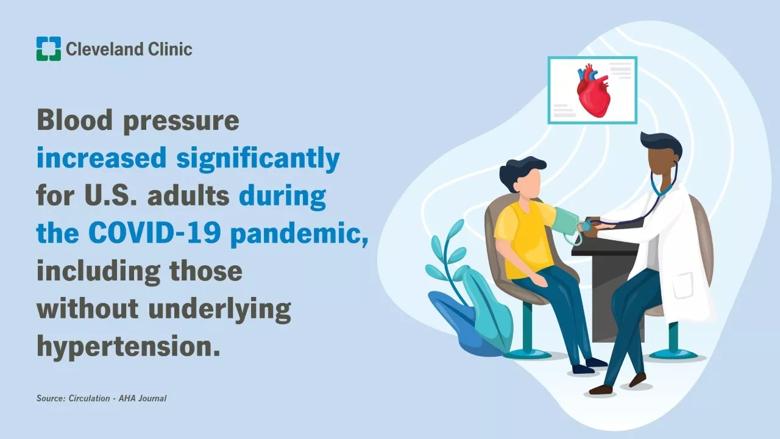The significant increases in blood pressure were seen even in those without hypertension

A study analyzing over 450,000 people from all 50 states and the District of Columbia, found significant increases in blood pressure readings during the height of the COVID-19 pandemic. The study was published today in Circulation.
Researchers with Cleveland Clinic and Quest Diagnostics analyzed information from 464,585 people, all of whom participated in an annual employer-sponsored wellness program; operated by Quest Diagnostics. The data, based on tests performed by Quest Diagnostics showed a significant increase in blood pressure from April through December of 2020 – when many U.S. states put stay-at-home orders in place – compared to the same time period in 2019.
During that period of time, mean increases each month, compared to the previous year, ranged from 1.10 to 2.50 mm Hg for systolic blood pressure and 0.14 to 0.53 mm Hg for diastolic blood pressure. Increases were seen across all age groups in both men and women- though, a larger increase was seen in women.
“We know that in addition to poor diet, inactivity and, lack of sleep, other lifestyle factors such as stress increase blood pressure,” said Luke Laffin, M.D., study author and co-director of the Center for Blood Pressure Disorders in the Heart, Vascular and Thoracic Institute at Cleveland Clinic. “As we begin to look into the psychological and physical toll of the COVID-19 pandemic, we wanted to see what type of effect the pandemic may have had on people’s blood pressure.”

Image content: This image is available to view online.
View image online (https://assets.clevelandclinic.org/transform/fc75d438-bc5b-42d8-808d-4f66ada074e9/thumbnail_21-MSR-2559513-BloodPressure-1920x1080-v2_jpg)
According to the Centers for Disease Control and Prevention, nearly half of adults in the United States have hypertension, which increases the risk for heart disease and stroke, and was the primary or contributing cause in more than half a million deaths in 2019.
“While weight gain was not the reason seen here for blood pressure increases, other possible reasons could be higher alcohol consumption, less physical activity, emotional stress and reduced medication adherence,” said Stanley Hazen, M.D., Ph.D., study author and chair of Lerner Research Institute’s Department of Cardiovascular and Metabolic Sciences, and co-section head of Preventive Cardiology in the Heart, Vascular and Thoracic Institute at Cleveland Clinic.
“The rise in blood pressure revealed by our Health Trends data raise concerns that many Americans are at risk for cardiovascular events. Since elevated blood pressure is often undetectable until the worst outcomes occur, individuals who delayed preventive care during the pandemic may be at risk and not even know it,” said Harvey W. Kaufman, M.D., Senior Medical Director, Head of the Health Trends Research Program for Quest Diagnostics. “We hope this study highlights the need for Americans to get back to their doctors as soon as possible, so that cardiovascular health risks can be addressed, and patients can have the best outcomes possible.”
Blood pressure is the measurement of the pressure or force of blood pushing against blood vessel walls. Your blood pressure reading has two numbers. The top number is the systolic blood pressure, which measures the pressure when your heart beats, while the bottom number measures the pressure between beats. Blood pressure numbers of less than 120 over 80 mm Hg are considered normal. Hypertension is when blood pressure is consistently high, ranging from 130 over 80 or higher.
“Continued monitoring of blood pressure trends are crucial as we emerge from this pandemic and begin to see the toll it has taken,” said Dr. Laffin. “High blood pressure can be treated through lifestyle modifications and medications, so find out your numbers and talk to your physician.”
Cleveland Clinic is a nonprofit multispecialty academic medical center that integrates clinical and hospital care with research and education. Located in Cleveland, Ohio, it was founded in 1921 by four renowned physicians with a vision of providing outstanding patient care based upon the principles of cooperation, compassion and innovation. Cleveland Clinic has pioneered many medical breakthroughs, including coronary artery bypass surgery and the first face transplant in the United States. Cleveland Clinic is consistently recognized in the U.S. and throughout the world for its expertise and care. Among Cleveland Clinic’s 82,600 employees worldwide are more than 5,786 salaried physicians and researchers, and 20,700 registered nurses and advanced practice providers, representing 140 medical specialties and subspecialties. Cleveland Clinic is a 6,728-bed health system that includes a 173-acre main campus near downtown Cleveland, 23 hospitals, 280 outpatient facilities, including locations in northeast Ohio; Florida; Las Vegas, Nevada; Toronto, Canada; Abu Dhabi, UAE; and London, England. In 2024, there were 15.7 million outpatient encounters, 333,000 hospital admissions and observations, and 320,000 surgeries and procedures throughout Cleveland Clinic’s health system. Patients came for treatment from every state and 112 countries. Visit us at clevelandclinic.org. Follow us at x.com/CleClinicNews. News and resources are available at newsroom.clevelandclinic.org.
Editor’s Note: Cleveland Clinic News Service is available to provide broadcast-quality interviews and B-roll upon request.